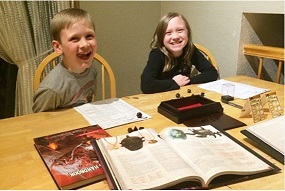This is Faith in Play #65: Family, for April 2023.
There has been a lot of talk in recent years about something called “Family Game Night”, the idea that families benefit by spending time together playing games. Some might be offended by the use of the slogan, “The family that plays together,” but it’s probably just as true as the sentiment that it echoes. I thought I’d contribute some thoughts to this.

Although I was a married adult when I began playing and running role playing games, I suspect that I’m not in a minority when I say that I was playing before I had children. Young children can be a complication–once we had them, we were less likely to go to someone else’s house for a game (babysitters were not in the budget), so games were held at our house almost exclusively. It was often the case that the youngest child sat next to me in a high chair, sometimes playing with dice on his table. However, when they could read and write adequately to keep up character papers, which meant the completion of first grade, they were invited to join whatever game was currently in progress.
That almost always meant the original edition of Advanced Dungeons & Dragons™, and it frequently meant a game with teenagers and adults at the table. They usually started as fighters, thieves, or fighter/thieves, as these classes required the least reading (that is, no spells to understand), but they weren’t limited and quickly became familiar enough with the game to try other things. It helped their math and reading skills, and encouraged strategic thinking and problem solving, but it did more than that: it helped develop social skills.
The world was different then. Video games were played on consoles at home, and the internet, although it existed, was a place for businesses, governments, and university researchers to interact with each other. America wasn’t online. However, gaming gave my sons the social tools to interact with other people, and today they have friends around the world. It wasn’t just gaming that did that, and certainly today having friends around the world is not an uncommon thing, but role playing games contributed to that.
They also helped build bonds between us. Many of our memories connect us through games we played–indeed, just recently a man now in his forties contacted me and thanked me for the many memories he has of having played in my games in his teens. We made connections; we learned about each other; we bonded. Games helped build our family structure, and I feel I have a better connection with my sons because of them.
Is that universal? I can only say that this has been my experience, and I have read the testimony of others on the same point. I recommend trying it. Kids play role playing games as preschoolers–they call it “let’s pretend” or “make believe”. It is easy for them to play; the difficulty lies in adapting that inventive imagination to the structures of the game. Once that part is accomplished, they can be some of the best gamers at your table.
So make gaming a family activity. It will help build your family.
Previous article: A Kingdom Allegory.
Next article: Promises.
